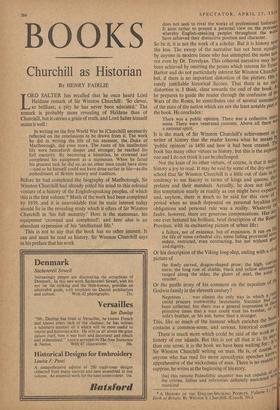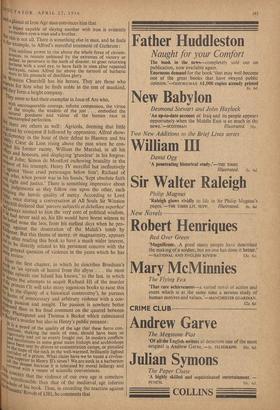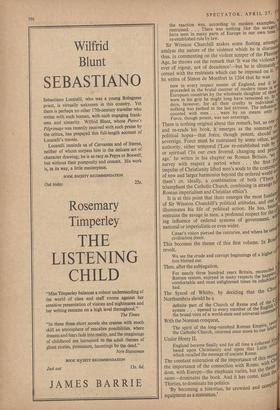BOOKS
Churchill as Historian
BY HENRY FAIRLIE LORD SALTER has recalled that he once heard Lord Haldane remark of Sir Winston Churchill: 'So clever, so brilliant; a pity he has never been educated.' The remark is probably more revealing of Haldane than of Churchill, but it carries a grain of truth, and Lord Salter himself states it well : In writing on the first World War he [Churchill] necessarily reflected on the conclusions to be drawn from it. The work he did in writing the life of his ancestor, the Duke of Marlborough, did even more. The roots of his intellectual life were henceforth deeper and stronger; he reached his full maturity. By becoming a historian, he crowned and completed his equipment as a statesman. When he faced his greatest task he did so, as no other man could have done —and as he himself could not have done earlier in life—as the embodiment of British history and tradition.
Before he had completed the biography of Marlborough, Sir Winston Churchill had already pitted his mind to this colossal venture of a history of the English-speaking peoples, of which this is the first volume.* Much of the work had been completed by 1939, and it is unavoidable that its main interest today should lie in the revealing study which it offers of Sir Winston Churchill in 'his full maturity.' Here is the statesman, his equipment 'crowned and completed'; and here also is an abundant expression of his 'intellectual life.'
This is not to say that the book has no other interest. It can and must be read as history. Sir Winston Churchill says in his preface that his work does not seek to rival the works of professional historians. It aims rather to present a personal view on the processe; whereby English-speaking peoples throughout the world have achieved their distinctive position and character. So be it, it is not the work of a scholar. But it is history nailic the less. The sweep of the narrative has not been equallo by anyone in modern times who has attempted the same task' not even by Dr. Trevelyan. This coherent narrative may have, been achieved by omitting the points which interest Sir Ernes' Barker and do not particularly interest Sir Winston Churchill: but, if there is no important distortion of the picture, this is surely justifiable historical licence. That there is no such distortion is. I think, clear towards the end of the book. As he prepares to guide the reader through the confusion of the Wars of the Roses, he contributes one of several summaries of the state of the nation which are not the least notable part clf the book. He concludes : There was a public opinion. There was a collective mor31, sense. There were venerated customs. Above all there 011' a national spirit.
It is the mark of Sir Winston Churchill's achievement as writer of history that the reader knows what he means 1)). `public opinion' in 1450 and how it had been created. Pie book has many other virtues as history, but this is the supreme,, one and I do not think it can be challenged.
Not the least of its other virtues, of course, is that it ina history a joy to read. It may be said by some of the dry-as-P,' school that Sir Winston Churchill is a little out of date in 11!; tendency to see history in terms of kings and queens. prelates and their marshals. Actually, he does not fall I': this temptation nearly as readily as one might have expectfd' s and, anyhow, there is much to be said for this view 01 d period when so much depended on personal loyalties art obligations and personal rule was a reality. Whatever the, faults. however, there are generous compensations. Has ari).. one ever bettered his brilliant, brief description of the R0111:I1 Province, with its enchanting picture of urban life: a failure, not of existence, but of expansion. It ran on the life of some cathedral city, some fading provincial tows sedate, restricted, even contracting, but not without gra and dignity. Or his description of the Viking long-ship, ending with a vi`'" picture of the finely carved, dragon-shaped prow; the high, car,; stern; the long row of shields, black and yellow alternate';: ranged along the sides; the gleam of steel, the scent murder. Or the gentle irony of his comment on the nepotism of till Godwin family in the eleventh century? Nepotism . . . was almost the only way in which a railoc; could procure trustworthy lieutenants. Statistics bad,hics been collected, but there was a general impression III primitive times that a man could trust his brother, or wife's brother, or his son, better than a stranger. This, like so much of the humour which enriches the b contains a common-sense, and serious, historical corim' There is much more which could be said of the work 80' re history of our islands. But this ,is not all that it is. in 111.t is than one sense, it is the book we have been waiting for: I as Sir Winston Churchill writing on man. He is, of course'sys, anyone who has read his more apocalyptic speeches 101° to apprehensive of the wickedness of man. There is no reils°11 suppose, he writes at the beginning of his story, that this remote PaIxolithic ancestor was not capable of 101 "1 the crimes, follies and infirmities definitely associated mankind * A HISTORY OF 11IE ENGLISH-SPEAKING PEOPLES. V0/11///e / Birth of Britain. By Winston S. Churchill. (Cassell, 30s.) and a glance at Iron Age man convinces him that a biped capable of slaying another with iron is evidently b to modern eyes a man and a brother. 'Itt this is not all. There is something else in man, and he finds 't, for example, in Alfred's merciful treatment of Guthrum : This sublime power to rise above the whole force of circum- stances, to remain unbiased by the extremes of victory or defeat, to persevere in the teeth of disaster, to greet returning fortune with a cool eye, to have faith in men after repeated betrayals, raises Alfred far above the turmoil of barbaric si wars to his pinnacle of deathless glory. ,r Winston Churchill has his heroes. They are those who express for him what he finds noble in the rest of mankind, and they form a bright company. They seem to find their examplar in Joan of Arc who, with unconquerable courage, infinite compassion, the virtue of the simple, the wisdom of the just . . . embodied the natural goodness and valour of the human race in But unexampled perfection. iQstil thereinre others as well : Agricola, deeming that little iligained by conquest if followed by oppression; Alfred show- d'lemency in the hour of their defeat to Haesten and his firllY; Coeur de Lion rising above the past when he nied his former nemy, William the Mara in all cohni- iA"es and hoourseand displaying 'grandeurshnl ,his forgives ss ks of John; Simon de Montfort eschewing brutality in the soutlient of his triumph; Henry IV merciful but ineffectively %t1gairist 'these cruel personages below him'; Richard of its^ who, when power was in isomer hands, 'kept absolute faith th: right and justice.' There is hing impressive about elevse judgements as they follow one upon the other, each Sill:ling the heroic quality of mercy. According to Lord Cim`r• once during a conversation at All Souls Sir Winston 4tehill declared that • parcere subjectis et debellare superbos' If hal,waYs seemed to him the very core of political wisdom. the "ad never said so, his life would have borne witness to ii;stZelief none the less, from his earliest days when he pro- kited against the desecration • of the Mandi's tomb by to ,,uener. But this theme of mercy, or magnanimity, appears and after reading this book to have a much wider interest, yore be be directly related to his persistent concern with the tIndee general question of violence in the years which he has r review. Pro NI ni the first chapter, in which he describes Boadicea's horekt ins an uprush of hatred from the abyss . . . the most he sniule episode our Island has known,' to the last. in which urtOrtis the attempts to acquit Richard III of the murder issu'lee Princes (It will take many ingenious books to raise this the t1t0 the dignity of a historical controversy'), he pursues vineilenie of unnecessary and arbitrary violence with a con- ttprilg Passion and insight. The passion is nowhere better lienressed than in his final comment on the quarrel between Becket and Thomas a Becket which culminated ekt's murder but also in Henry's public penance : tent n - Proof of the quality of the age that these fierce con- eions, shaking the souls of men, should have been so 11gRiornij .. sly and yet so evenly fought out. In modern conflicts ;`,..v revolutions in some great states bishops and archbishops ,iiilittiel been sent by droves to concentration camps, or pistolled eory;e, nape of the neck in the well-warmed, brilliantly lighted tion'('°I. of a prison. What claim have we 'to vaunt a civilisa- all vsuperior to Henry II's times? We are sunk in a barbarism e,_ elle deeper because it is tolerated by moral lethargy and Thit "v red with a veneer of scientific conveniences. it-Iiiot‘s concern that the violence of our own age is somehow the vi', Lprehensible than that of the medkeval; age informs thep,n0le of his book. Thus, in recording the reaction against -asants' Revolt of 1381, he comments that the reaction was, according to modern examples, restrained. . . . There was nothing like the savagery have seen in many parts of Europe in our own time re-established rule by law. Sir Winston Churchill makes some fleeting attempt' analyse the nature of the violence which he is discuss0 thus, in commenting on the violent temper of the Plantag' Age, he throws out the remark that 'It was the violence ever of vigour, not of decadence'—but he is ultimately cerned with the restraints which can be imposed on it. T he writes of Simon de Montfort in 1264 that he was now in every respect master of England, and if be,„ proceeded in the brutal manner of modern times in $c', European countries by the wholesale slaughter of those were in his grip he might long have remained so. in t„ days, however, for all their cruelty y in individual nothing was pushed to the last extreme. The influences counted with men . . . were by no means only 41' Force, though potent, was not sovereign. rci There is nothing original about this remark, but, as one f and re-reads his book, it emerges as the summary nI) political hopes—that force, though potent, should '110 sovereign. Force must be restrained by some other, acce(s■ authority, either temporal CLaw re-established rule bY or spiritual (In our own fevered, changing and preee age,' he writes in his chapter on Roman Britain, 'we survey with respect a period when . . . the first 1°,1,, impulse of Christianity lifted men's souls to the contenill'' of new and larger harmonies beyond the ordered world 3 them') or, ideally, a combination of both (`There ,91i triumphant the Catholic Church, combining in strange 'a Roman imperialism and Christian ethics'). It is at this point that there emerges the most fundellid of Sir Winston Churchill's political attitudes, and one 4' illuminates his life of political action. He has, beav .restrains the savage in men, a profound respect for the ing influence of ordered systems of government, national or imperialistic or even wider. Caesar's vision pierced the centuries, and where be 01/4 civilisation dwelt. This becomes the theme of this first volume. In B°ad revolt, We see the crude and corrupt beginnings of a higher ci tion blotted out.
Then, after the subjugation, For nearly three hundred years Britain, reconciled Roman system, enjoyed in many respects the hapPiesIti' comfortable and most enlightened times its inhabilall had. il The Synod of Whitby, by deciding that the rhUrC Northumbria should be a With the Norman conquest, The spirit of the long-vanished Roman Empire, r,elL the Catholic Church, returned once more to our Isla' England became finally and for all time a coherent cidisP based upon Christianity and upon that Latin el- which recalled the message of ancient Rome. gsa6 The constant reiteration of the importance of this Ine,,-0 the importance of the connection with Rome, with dom, with Europe—the emphasis varies, but the thellillerl same—dominates the book. And it has come, since t' Thirties, to dominate his politics. el 'By becoming a historian, he crowned and con1P equipment as a statesman.' definite part of the • Church of Rome and of the Cdr system . . . opened to every member of the Ertglis",,i0 the broad vista of a world-state and universal comet Under Henry II,












































 Previous page
Previous page